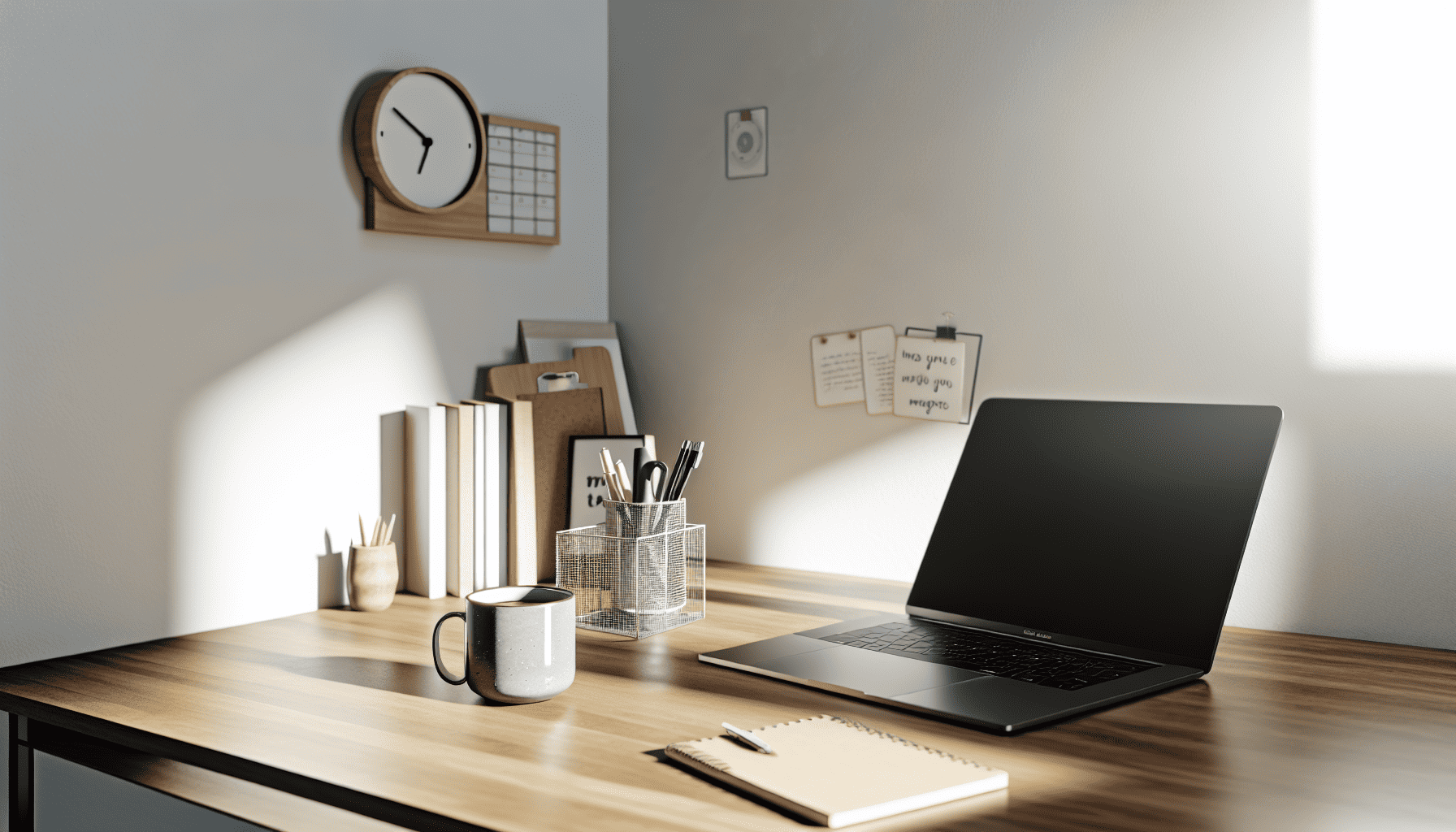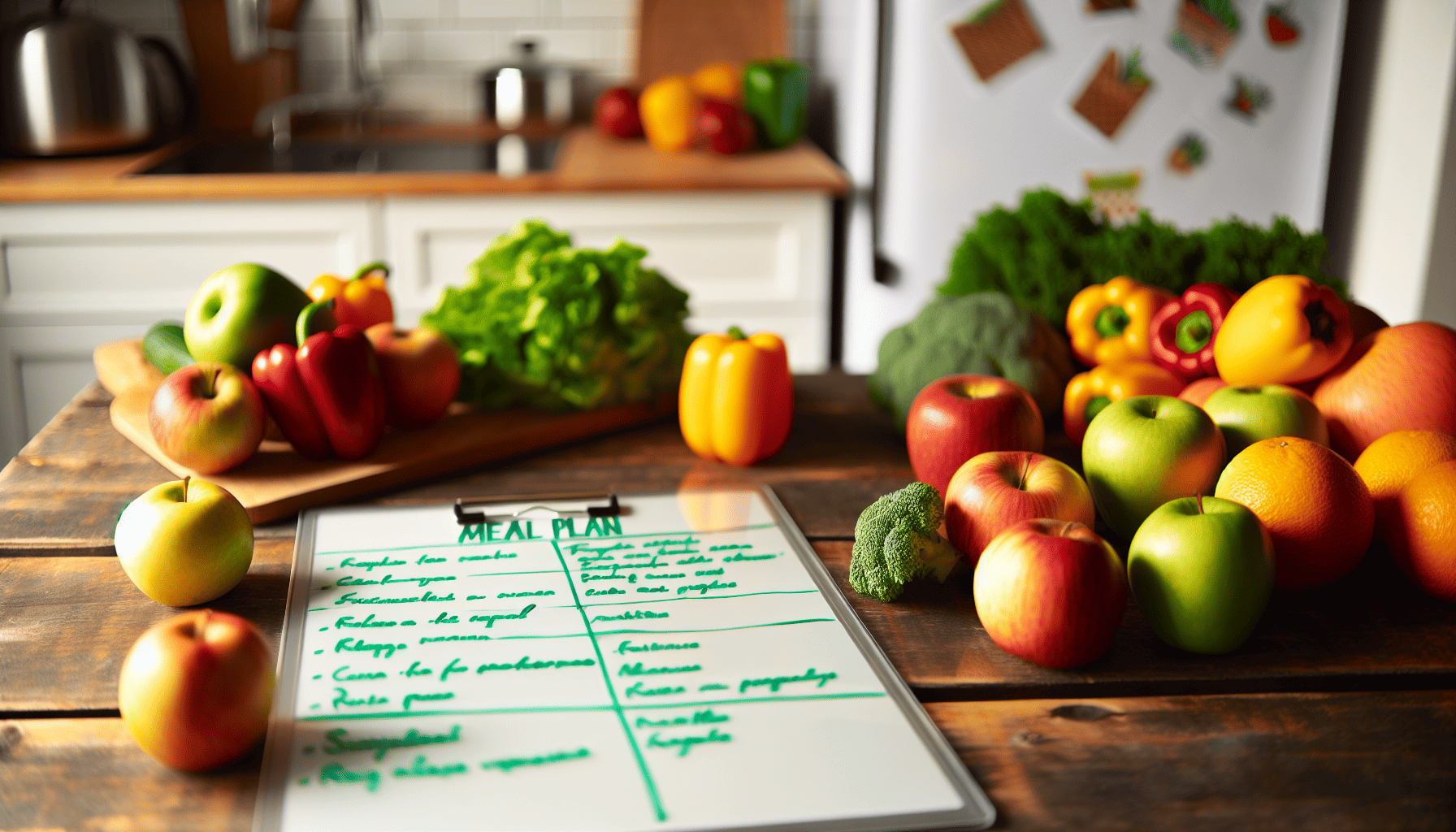If chaos reigns in your day-to-day, it’s time to take control. This article cuts straight to the chase on how organize your life, offering you a robust framework to categorize, prioritize, and streamline your tasks. Expect no-nonsense advice on everything from to-do list mastery to home organization, with tools and systems designed for real impact. Step-by-step, you’ll learn to manage not just your time, but also your space and finances, paving the way for a more serene, structured, and satisfying life.
Key Takeaways 🗝️💡✅📝
Master to-do lists by prioritizing tasks, using action verbs, setting deadlines, and breaking them into subtasks for daily and weekly productivity boosts.
Declutter both your physical and digital spaces to reduce stress and improve concentration, while mindfulness practices can organization your mental space and foster well-being.
Financial health is achieved through creating a solid personal finance plan with a budget and effective money management routines, ensuring financial freedom and reduced stress.
Mastering the To-Do List ✍️✔️📋✅

Ah, the humble to-do list. A simple yet powerful tool that can make or break your day. A well-structured to-do list can be a game-changer in enhancing your productivity and keeping your life organized. It’s not just about jotting down tasks haphazardly, it’s about crafting a realistic, actionable plan that guides your day and sets you up for success.
In the upcoming sections, we’ll delve into the art of crafting your daily to-do list, prioritizing tasks, and streamlining your weekly goals. We’ll explore how starting tasks with verbs, setting deadlines, and breaking tasks into smaller subtasks can transform your productivity and make your life more organized.
Crafting Your Daily To-Do 🛠️📅✏️☑️
Every productive day starts with a well-crafted to-do list. But how do you ensure that your list is realistic, manageable, and aligned with your real-life priorities? The trick lies in prioritizing your tasks and creating separate lists for different areas of your life.
Start by prioritizing your tasks based on your calendar events. This helps you maintain clarity and focus on the tasks that are truly important. Limit your daily to-do list to three main items to ensure manageability and accomplishment. Separating personal tasks from team collaboration projects not only increases efficiency but also enhances clarity.
The Art of Prioritizing Tasks 🎨📝🔝✅
As the famous saying goes, “Not all tasks are created equal.” Some tasks are more impactful than others, and prioritizing them is a key tool in organizing your life. Prioritization allows efficient decisions about time and energy, which leads to stress reduction and increased confidence in handling tasks at work, school, and home.
Effective prioritization techniques include:
Using the Eisenhower matrix to categorize tasks
Assigning numbers for relative prioritization
Creating a daily prioritized task list based on available time and task importance
By focusing on only what is considered the Most Important Tasks (MITs) each day, you can maintain balance and avoid feeling overwhelmed.
Streamlining Your Weekly Goals 🌊🗓️🎯💼
With your daily tasks under control, it’s time to zoom out and look at the bigger picture: your weekly goals. Streamlining your weekly goals is about more than just creating a long to-do list. It’s about tracking your goals, setting deadlines, and prioritizing tasks to ensure that your week is productive and stress-free.
Google Calendar can be effectively used to create and monitor personal goals by setting up categories and custom goals with prompts provided by the app. Further, simple to-do list apps like Todoist offer streamlined interfaces for tracking goals, deadlines, and priorities, making them suitable for personal productivity management. By utilizing such tools, you can keep important dates and deadlines in sight and prevent tasks from being forgotten.
Decluttering Your Space and Mind 🏠➡️🗑️🧠💭🌬️

Now that we’ve tamed the chaos of to-do lists, let’s tackle another critical aspect of organization: decluttering. Decluttering isn’t just about creating a visually pleasing environment; it’s about enhancing focus, reducing stress, and creating a sense of calmness. It’s about creating a physical and mental space that promotes productivity and well-being.
Both your physical and mental spaces are interconnected. A cluttered room can lead to a cluttered mind, affecting your mental health negatively. Conversely, a tidy home environment supports better relationships, improves self-esteem, and contributes to improved mental health. In the following sections, we’ll delve into the art of conquering physical clutter, simplifying digital overload, and organizing mental space.
Decluttering your environment doesn’t have to be an overwhelming task, especially when dealing with too much stuff. Starting small, such as decluttering a single drawer, and not aiming for perfection encourages a stress-free approach to tidying up. By designating specific locations for your possessions, you avoid the creation of clutter and ensure that everything has a rightful place in your home, always returning items to the same place.
Conquering Physical Clutter 🛡️🏠🗑️✨
Physical clutter can be a major detriment to your productivity and stress levels. An organized workspace can lead to reduced stress and increased productivity, as clutter affects the brain’s ability to concentrate. But how do you conquer physical clutter effectively?
Start organizing your workspace by following these steps:
Remove everything from your workspace and clean all surfaces.
Sort through all items, categorizing them into piles to keep, archive, or discard.
Rearrange your workspace to ensure frequently used items are within easy reach and less used items are stored away.
By following these few tips, you can create a more organized and efficient workspace.
Simplifying Digital Overload
In the digital era, clutter isn’t just physical. Our digital spaces, such as our email inboxes and desktops, can also become cluttered, leading to more clutter, stress, and reduced productivity. That’s why it’s essential to manage digital clutter effectively.
By implementing folder management strategies like creating folders for specific document types and regularly cleaning them, you can ensure easier file access and maintain device health. Managing your inbox by promptly deleting unnecessary emails and employing email tags or filters can maintain an organized digital space and save time.
Organizing Mental Space
Last but not least, organizing your mental space is crucial for maintaining overall mental health. It’s about making space for your thoughts, eliminating unnecessary worries, and focusing on what truly matters.
Mindfulness and meditation practices are proven to have numerous benefits, including:
Reducing stress and anxiety
Improving mental and physical health
Enhancing creativity
Improving sleep quality
By incorporating mindfulness into your daily routine, you can experience these positive effects.
Financial Organization for Freedom

Financial organization is another crucial aspect of mastering simplicity. Being in control of your finances not only gives you financial freedom but also contributes to a stress-free life. Efficient spending tracking, budgeting, and planning for future investments are key strategies for organizing your finances effectively.
A comprehensive budget includes:
Fixed expenses
Variable expenses
Debts
Savings
These components are essential for managing finances effectively. By consistently saving a portion of your salary and investing wisely, you can grow your net worth over time and ensure organized financial health.
In the following sections, we’ll delve deeper into creating a solid personal finance plan and efficient money management routines.
Creating a Solid Personal Finance Plan
Managing your finances effectively requires a solid personal finance plan. Such a plan should include an emergency fund, a realistic monthly budget, and a retirement savings strategy.
An emergency fund should start with an achievable goal, such as saving $500, and eventually expand to cover three to six months’ worth of living expenses. Early initiation of a retirement saving strategy, including employer 401(k) matching and other investment accounts, is crucial for income growth over time and maintaining quality of life during retirement.
Efficient Money Management Routines
Once you have a solid personal finance plan in place, it’s crucial to implement efficient money management routines. Such routines can help you maintain control over your finances and adhere to your set budget.
Routine tracking of spending using budget worksheets and interactive tools can help maintain control over finances and adherence to set budgets. Paying bills on time every month is crucial to avoid late fees, improve credit scores, and secure better interest rates. By doing so, you can effectively spend money without going beyond your financial limits.
Balancing Self Care with Busy Schedules

In the quest for organization and productivity, it’s easy to neglect one crucial aspect: self-care. Balancing self-care with a busy schedule is key to preventing stress and burnout. After all, you can’t pour from an empty cup.
In the following sections, we’ll delve into:
Developing a self-care routine
Stress reduction through organization
The importance of proper nutrition
Adequate rest
Regular physical activity
All of these factors are crucial in maintaining good health and productivity.
Developing a Self-Care Routine
A self-care routine is crucial in maintaining good health and productivity. It’s about taking care of your physical health, mental health, and overall well-being by adopting healthy habits.
To incorporate essential self-care practices into a daily routine, schedule self-care activities, workouts, and prioritize free time for activities in the digital calendar. Making sleep a priority by setting aside time for adequate rest contributes to feeling rested and full of energy, an essential aspect of a self-care routine.
Stress Reduction Through Organization
Reducing stress is another crucial aspect of self-care. Effective organization techniques can play a significant role in reducing stress and enhancing well-being.
Outsourcing repetitive tasks can save significant time and greatly reduce stress levels. Utilizing time blocking can improve work focus by shielding from interruptions and enabling deep work, while the Pomodoro technique enhances productivity by focusing on one task at a time.
Optimizing Home Management

Managing your home efficiently can significantly contribute to your overall organization. By implementing routines and systems to organize your life, you can improve various aspects of daily living such as:
meal planning
laundry
budgeting
grocery shopping
You can run your own business and household efficiently.
In the following sections, we’ll delve into meal planning mastery and home organization hacks. We’ll explore how meal planning can save time, reduce stress, and ensure healthier food options, and present home organization hacks for a clutter-free and efficient living space.
Meal Planning Mastery
Meal planning is a key aspect of efficient home management. By planning your meals in advance, you can save time, reduce stress, and ensure that you and your family are eating healthy, nourishing meals.
Meal planning can save time and lead to a healthier lifestyle by reducing stress and ensuring nourishing food options. To efficiently plan meals, consider existing pantry items, utilize a recipe binder or digital board for new recipes, and select meals based on the time available for cooking.
Home Organization Hacks
Home organization hacks can transform your living space into a clutter-free and efficient environment. By implementing simple organizational techniques, you can make the most of your space and enhance your productivity.
Adopting a minimalist mindset in desk organization reduces clutter and the need for unnecessary storage units, creating a beautifully simple workspace. Hanging closet organizers provide instant storage for extra office supplies, especially when space is limited, without occupying as much space as a bookcase.
Nurturing Relationships in an Organized Life
While organization is crucial in managing tasks and responsibilities, it’s equally important in nurturing relationships. Cultivating relationships with family and friends is a key factor in living a fulfilling life for an organized person.
In the following sections, we’ll delve into scheduling time for loved ones and cultivating meaningful connections. We’ll explore how digital calendars and prioritizing family time can help maintain strong social relationships and how quality over quantity in friendships and celebrating friends’ special occasions can help sustain meaningful connections.
Scheduling Time for Loved Ones
In our busy lives, it’s easy to let weeks or even months slip by without spending quality time with our loved ones. That’s why scheduling even just a few minutes for loved ones is crucial in maintaining strong social relationships.
Use digital calendars shared among family members to organize and visualize upcoming family events, and set up recurring reminders for important dates like birthdays. Make family time an indispensable part of your calendar by treating it with the same commitment and respect as important meetings.
Cultivating Meaningful Connections
Cultivating meaningful connections is essential for mental and physical health. Strong social connections can enhance your wellbeing and reduce feelings of loneliness.
Quality over quantity in friendships is crucial, so it’s important to prioritize and intentionally make time for the most important social connections. Replacing passive activities like social media browsing and watching TV with engaging in real-life interactions can deepen friendships and reduce feelings of loneliness.
Leveraging Tech Tools for Ultimate Organization
In today’s digital era, tech tools can significantly enhance your organization. From digital calendars to comprehensive organization apps like Notion, tech tools can simplify the process of organizing your life.
In the following sections, we’ll delve into Notion: Your All-in-One Organizer and Integrating Apps into Your Routine. We’ll explore how you can leverage Notion and other apps for ultimate organization.
Notion: Your All-in-One Organizer
Notion is a comprehensive tool that can transform your organization. It’s a connected workspace that allows for:
extensive note-taking
documentation
wikis
project management
customization to fit a wide array of uses in both personal and professional life.
Notion offers a cohesive platform that combines pages, databases, and various views to manage tasks, consolidate information from different sources, and maintain both essential and extraneous data in one place. By leveraging Notion, you can organize every aspect of your life.
Integrating Apps into Your Routine
Integrating apps into your daily routines can enhance your organization. By leveraging apps like Notion, you can centralize your tasks and manage your time more efficiently.
Digital to-do lists like Notion offer features such as:
Sorting and prioritizing work
Setting recurring tasks
Multiple views
Reminding users of due dates
By regularly updating tasks and utilizing templates within Notion, you can maintain consistency and save time, essential for personal organization.
Summary
Mastering simplicity through organization is not only achievable but also empowering. From mastering the art of to-do lists to optimizing home management, the strategies we’ve explored can transform your life, reducing stress, enhancing productivity, and facilitating financial freedom.
Remember, the journey to an organized life doesn’t happen overnight. Take it one step at a time, implementing the strategies that resonate with you most. With persistence and dedication, you’ll soon start to see the transformative power of organization in your life.
Frequently Asked Questions
How do I start organizing my life?
Start organizing your life by creating daily routines, making lists, and using tools like Google Calendar, Toggl, Asana, Trello, or Notion to manage your time and projects effectively. Prioritize deep work and find opportunities for automation and outsourcing to achieve a balanced life.
Why is it so hard to organize my life?
It may be hard to organize your life because of indecisiveness. Indecisiveness can stem from reasons like being overwhelmed, perfectionism, fear of failure, or lacking confidence, and may even be linked to conditions like ADHD.
How do I organize my daily routine?
To organize your daily routine, start by establishing a morning routine and prioritizing your tasks. Use a daily planner app, learn to delegate, and create a dedicated workspace to stay focused and productive. Regularly review and update your plans to maintain efficiency and effectiveness in your daily life. Stay flexible and adaptable to accommodate any unexpected changes or new tasks that may arise.
What is Notion, and how can it help in organization?
Notion is a versatile tool for organizing notes, projects, and more in one place, making it easier to manage tasks and consolidate information from different sources. With its wide array of uses, it can help in both personal and professional life.
What is the significance of a self-care routine?
A self-care routine is essential as it helps maintain good health and productivity by taking care of physical health, mental well-being, and overall health through practices like nutrition, rest, and physical activity. Prioritizing self-care can lead to improved quality of life and well-being.
1 thought on “Mastering Simplicity: How to Organize Your Life with Proven Strategies ✨📚🔍🔄✔️”